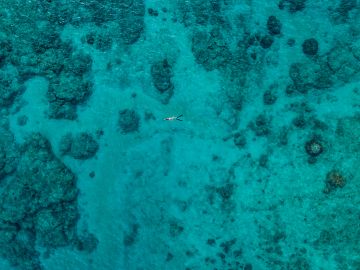Greece’s Posidonia seagrass faces threats from anchoring, pollution and other human interventions. In order to inform the proper protection of vital and ancient seagrass habitat, Blue Marine is working to provide a comprehensive assessment of the carbon removal and storage potential within Posidonia beds. Employing advanced hyperspectral cameras in collaboration with our partners, this project aims to generate advanced data to understand the climate implications of this vibrant ecosystem and enhance knowledge to help secure future climate smart marine protected areas (MPAs) across the Mediterranean. Since the partnership with Blue Marine Foundation began, research has been undertaken to better understand the carbon removal and storage potential of Posidonia seagrass, and a rare sighting of an endangered Mediterranean Monk Seal will help support protection proposals for the area.
Formentera’s seagrass meadows are believed to date back over 100,000 years, making them one of the oldest living things on the planet today. Unfortunately, they are under extreme threat from human impact such as pollution and boat disturbance. In collaboration with Blue Marine’s local partners, Blue Marine is working to implement a citizen-driven initiative of “Posidonia Planting”. Between September 2023 and October 2024, 3,406 Posidonia plants have been planted, covering an area of approximately 113 m2 and exceeding our initial target of 3,000. So far, 3,406 Posidonia plants have been planted on rocky substrate. This pioneering pilot is showing success so far through strong seedling survival rates.
Mida Creek is home to an array of wonderful marine life, including a resident population of Indo-pacific dolphins, providing critical sea turtle habitat and nesting areas and a nursing ground for Humpback Whales. The Mida Creek project was started by Sustainable Surf and COBEC in 2020 during the pandemic, which left many people without work as the local economy relies on tourism. In the Watamu region of Kenya mangrove trees have been illegally harvested for lumber and charcoal production, due to local economic pressures. COBEC works with local villages to replant mangroves in deforested areas. The communities are educated about the environmental and economic importance of these ecosystems, and employed to grow seedlings, collect mangrove propagules, plant mangroves and monitor the growth of the trees. So far, our partners have successfully restored the target of 1.2 hectares of mangrove forest in Mida-Creek, employing community members to plant over 12,000 trees.
A mosaic of rich marine habitats, the Dutch Caribbean is home to an incredible host of marine species, such as hawksbill turtles, colourful parrotfish and sharks. To help protect them, the island of Aruba seeks to introduce a round-island marine protected area (MPA), to restore and protect its mangrove and seagrass habitat and create a “living lab”- a space to demonstrate various restoration practices and teach tourists about the work taking place on the island. On the island of Bonaire, mangrove forests are declining due to erosion. To tackle this, the Mangrove Maniacs, a volunteer group, are successfully re-opening mangrove channels to restore the waterflow which in turn restores oxygen levels and brings back the previously abundant marine life. Since the partnership began with Blue Marine Foundation, 500 red and black mangroves have been planted, and weekly volunteer sessions engaged local communities in preparing mangrove restoration channels.
Indonesia, accounting for 20 per cent of the world’s mangrove cover, has witnessed significant loss since the 1980s due to shrimp farming and coastal developments. In collaboration with local NGOs, Blue Marine’s work in Indonesia seeks to restore thousands of hectares of mangrove habitat, including 90 hectares of degraded aquaculture ponds in Lombok Island. Blue Marine will bring specialist technical knowledge to local NGO partners to set up a new project to support the restoration of mangrove ecosystems as well as delivering community education, monitoring and protection. Community members, local government officials, and local NGO representatives will be trained in world-leading community based ecological mangrove restoration techniques by Indonesian NGO, Blue Forests. A detailed engineering design will be developed and followed by a project manager and project coordinator, employing community members in restoration activities. The site will be developed as a mangrove eco-tourism destination centre to provide the community with alternative sustainable livelihoods.
Between 1970 and 2015, the Philippines lost 40 per cent of its mangroves, a vital blue carbon habitat that supports an abundance of species such as mudskippers, grouper, and the ancient horse shore crab (considered ‘living fossils’ as they’ve existed unchanged for over 400 million years). To address this, Blue Marine’s partner, Oceanus Conservation, has undertaken significant work to restore these blue forests, with over 8,000 seedlings planted in previously degraded areas. Their next target is a 10-hectare site in the country’s south, repurposing an abandoned shrimp farming site. By using a method that works with nature, Blue Marine seek to repair water flows and plant trees to stabilize sediment, letting nature oversee most of the restoration. Currently, 25 hectares are under ecological restoration and 45 local community members (so far) have been trained in restoring mangroves..
The marine and coastal environments of the Maldives are essential for its very existence as a low-laying island nation yet are under increasing threat from habitat degradation and rising sea levels. Building on Blue Marine’s extensive experience in the Maldives, this project has helped experts to understand that salinity stress, caused by a high sea level, was the primary reason for the large-scale die-back of mangroves in 2020. This research poses new considerations for workstreams going forward and will inform Blue Marine’s plans with Government to continue furthering seagrass protection across the island’s resorts. So far, critical mangrove loss research has been completed, to assist development of national restoration projects, and a seagrass education module developed for schools and resorts.




